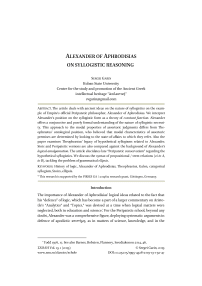Alexander of Aphrodisias on syllogistic reasoning
Автор: Garin Sergei
Журнал: Schole. Философское антиковедение и классическая традиция @classics-nsu-schole
Рубрика: Статьи
Статья в выпуске: 1 т.13, 2019 года.
Бесплатный доступ
The article deals with ancient ideas on the nature of syllogistics on the example of Empire's official Peripatetic philosopher, Alexander of Aphrodisias. We interpret Alexander's position on the syllogistic form as a theory of constant function . Alexander offers a conjunctive and purely formal understanding of the nature of syllogistic necessity. This approach to the modal properties of assertoric judgments differs from Theophrastus’ ontological position, who believed that modal characteristics of assertoric premises are determined by looking to the state-of-affairs to which they refer. Also, the paper examines Theophrastus’ legacy of hypothetical syllogisms related to Alexander. Stoic and Peripatetic versions are also compared against the background of Alexander's logical amalgamation . The article elucidates late “Peripatetic conservatism” regarding the hypothetical syllogistics. We discuss the syntax of propositional / term relations (εἰ τὸ Α, τὸ Β), tackling the problem of grammatical ellipsis .
History of logic, alexander of aphrodisias, theophrastus, galen, categorical syllogism, stoics, ellipsis
Короткий адрес: https://sciup.org/147215808
IDR: 147215808 | DOI: 10.25205/1995-4328-2019-13-1-32-47
Список литературы Alexander of Aphrodisias on syllogistic reasoning
- https://nsu.ru/classics/schole/13/13-1-garin.pdf
- Barnes, J. (1983) Terms And Sentences: Theophrastus On Hypothetical Syllogisms. Oxford.
- Barnes, J. (2012) Logical Matters: Essays in Ancient Philosophy II. Oxford.
- Barnes, J., Bobzien, S., Flannery, K., Ierodiakonou, K., trs (2014) Alexander of Aphrodisias. On Aristotle, Prior Analytics 1.1-7. London.
- Bobzien, S. (2002) "The Development of Modus Ponens in Antiquity: From Aristotle to the 2nd Century AD", Phronesis 47 (4), 359-394.
- Busse, A., ed. (1891) Ammonius. In Porphyrii Isagogen Sive V Voces, 4.3. Berlin.
- Busse, A., ed. (1898) Philoponus. In Aristotelis Categorias Commentarium. Berlin.
- Diirr, K. (1951) The Propositional Logic of Boethius. Amsterdam.
- Chaniotis, A. (2004) "Epigraphic Evidence for the Philosopher Alexander of Aphrodisias", Bulletin of the Institute of Classical Studies 47, 79-81.
- Flannery, K. L. (1995) Ways into the logic of Alexander of Aphrodisias. New York.
- Gili, L. (2015) "Categorical Μὴ Κατὰ Χρόνον Propositions in Alexander of Aphrodisias' Modal Syllogistic", Apeiron 48 (4), 1-17.
- Graeser, A. (1973) Die logischen Fragmenle des Theophrast. Berlin.
- Hintikka, J. (1973) Time and Necessity. Studies in Aristotle’s Theory of Modality. Oxford.
- Kalbfleisch, K., ed. (1907) Simplicius. In Aristotelis Categorias Commentarium. Berlin.
- Kalbfleisch, K., ed. (1896) Galenus. Institutio logica. Leipzig.
- Karimullah K. (2014) "Al-Farabi on Conditionals", Arabic Sciences and Philosophy 24, 211-267.
- Malink, M. (2015) "The Beginnings of Formal Logic: Deduction in Aristotle's Topics vs. Prior Analytics", Phronesis 60, 267-309.
- Mansfeld, J. (1994) Prolegomena. Questions to Be Settled Before the Study of an Author or a Text. London.
- Moraux, P. (2001) Der Aristotelismus bei den Griechen. Von Andronikos bis Alexander von Aphrodisias. Berlin.
- Mueller, I., ed. (2006) Alexander of Aphrodisias. On Aristotle, Prior Analytics 1.32-46. London.
- Sharples, R. W. (1987) "Alexander of Aphrodisias: Scholasticism and Innovation", Aufstieg und Niedergang der Römischen Welt, 2. Band 36.2. Berlin, 1176-1243.
- Speca, A (2001) Hypothetical syllogistic and Stoic Logic. Leiden.
- Todd, R. (1976) Alexander of Aphrodisias on Stoic Physics. Leiden.
- Topchyan, A., ed. (2010) David the Invincible. Commentary on Aristotle's Prior Analytics. Critical Old Armenian Text with an English Translation. Boston.
- Wallies, M., ed. (1883) Alexandri in Aristotelis Analyticorum Priorum Librum 1 Commentarium. Commentaria in Aristotelem Graeca 2.1. Berlin.
- Wallies, M., ed. (1905) Ioannis Philoponi in Aristotelis Analytica Priora Commentaria. Commentaria in Aristotelem Graeca 13.2. Berlin.


